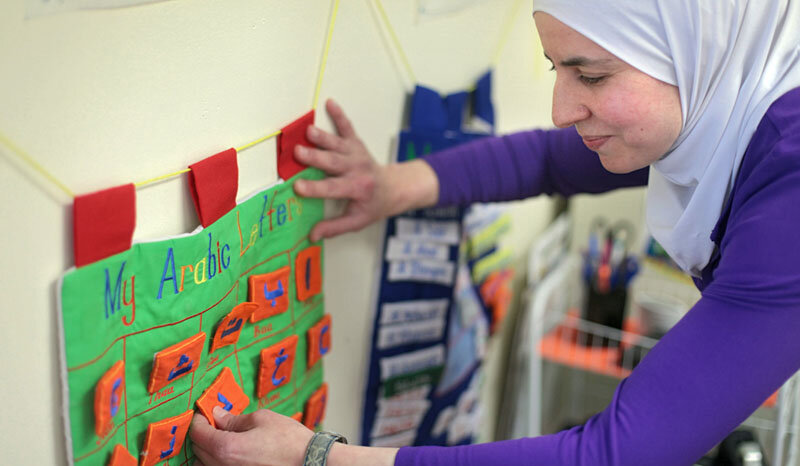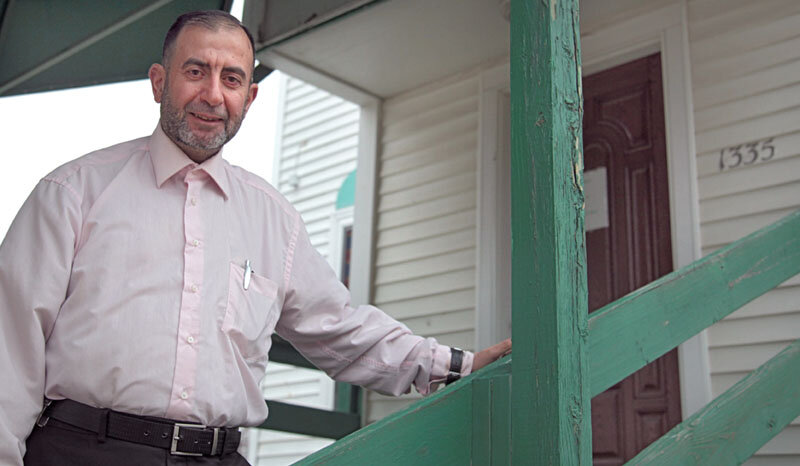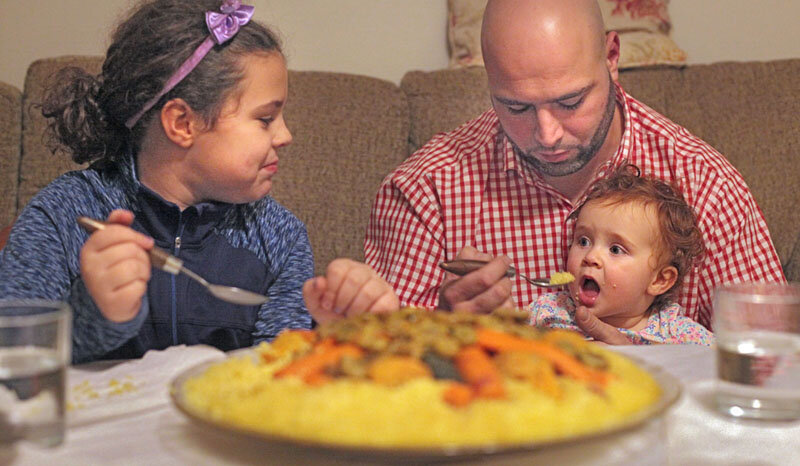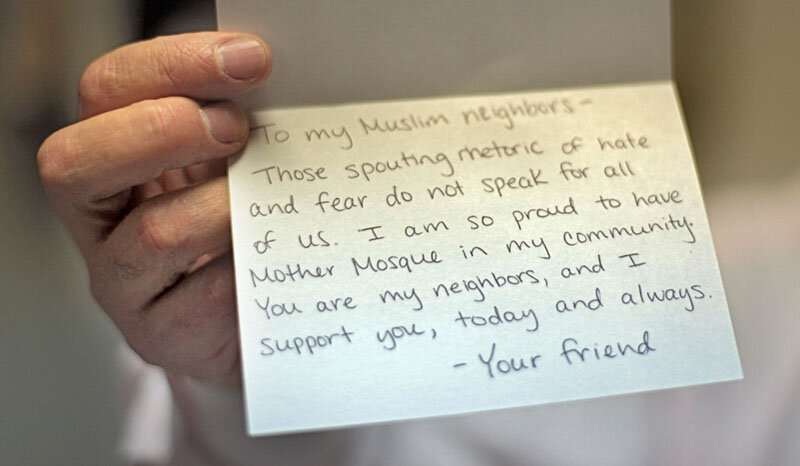Muslim Americans in the heartland reckon with sting of national politics
Cedar Rapids, Iowa has been home to Muslim-American community since the 19th century.




By Daniella Cheslow and Hannah Sheehan
MARCH 28, 2017—President Trump campaigned on a promise to ban Muslims from the country, and imposed travel restrictions on people from several Muslim-majority countries in his first few days in office. These moves have rattled Muslim Americans, even those who have lived in the U.S, for generations. One of those communities is in Cedar Rapids, Iowa.
Cedar Rapids is a corn processing capital. Quaker Oats has a factory there, right on the Cedar River. In the late 1800s this all-American town was a beacon to Syrian and Lebanese immigrants. And today, Linn County — where Cedar Rapids is located — is home to an estimated 5,000 Muslims.
Reporters Daniella Cheslow and Hannah Sheehan were in Cedar Rapids in the early days of the Trump administration and they bring us this snapshot of the community.
Thirty-five years ago, Imam Taha Tawil arrived in Cedar Rapids, Iowa, while visiting the United States for his brother’s wedding. Tawil, who worked as an attorney in a religious court in Jerusalem, was enchanted by a tiny Midwestern community of Muslims, the descendants of Syrian and Lebanese immigrants. In 1934 those newcomers built the longest standing Muslim house of worship in America, the Mother Mosque.
“The community of Iowa welcomed the immigrants and hosted them, and they become part of the fabric of Iowa,” Tawil says. “Iowa had a good heart.”
Like those early Middle Eastern immigrants, Tawil stayed on as well, using his skills as an Islamic scholar and a fluent Arabic speaker to lead a community where many third- and fourth-generation immigrants speak only English. He also restored the Mother Mosque, which had been rented to a church and then neglected for years. Tawil got it listed on the National Registry of Historic Places. It stands as a monument to the community’s history, even as most worshippers pray a few miles away in the Islamic Center of Cedar Rapids, built in 1971, covered in white tile and capped with two blue domes.
In recent months some Muslims in Cedar Rapids have begun to feel rattled. During his presidential campaign, Donald Trump proposed banning Muslim immigration to the US, and in his first few days in office, he imposed travel restrictions from Muslim-majority countries. The ripples from those restrictions have filtered into this community despite its long history.
On weekdays, Muslim kids go to a Montessori school held in the building. Iowa native Surriah Igram founded it in 2009 and named the school My Iman, which means My Faith. Igram has five kids and she says she founded the school as a place where they could learn Arabic and cultivate a strong Muslim identity. Today there are 26 students, ages 3 to 8. They read books like “It’s Ramadan, Curious George” and study Arabic letters off colorful embroidered charts.
In opening the school, Igram was carrying on a family tradition of creating institutions in Cedar Rapids. Her great-grandfather, a Lebanese immigrant, helped build the Mother Mosque. She says it’s an amazing feeling to see the school take shape.
“It’s like how you feel about a plant that’s grown, a beautiful plant,” Igram says. “You feel great about that because you’ve had it for years and you helped it grow.”
And at first, Igram was eager to introduce reporters into her life, inviting us to visit her family at home. But then, she changed her mind and asked if we could we meet at a coffee shop instead.
“I started to feel nervous because I didn’t want to expose to expose my kids or my family,” she says.
Igram says this anxiety is new for her. She was born in Iowa’s capital, Des Moines. She’s used to feeling comfortable as a Muslim in America. But she says she started feeling nervous during Trump’s campaign. At one rally in 2015, a man in the crowd stood up and said, ‘the problem in this country is Muslims’ — and Trump didn’t say a thing.
Igram says the incident signaled a change in the way her fellow Americans see her, and it has pushed her into lockdown.
“Going out at night, I don’t do that anymore,” Igram says. “I go to the grocery store, but I really try to limit where I go because I’m nervous about how people might feel.”
Hate groups targeting Muslims have nearly tripled in America since the beginning of 2016, according to the Southern Poverty Law Center. Some research shows that women who cover their hair with a hijab are more likely victims than others. Igram started to cover her hair when she was 19.
“I chose to do it,” she says. “I was never religious before that.”
Since then, the hijab has become a symbol of her faith, but she says she wonders “all the time” if people would feel differently about her if she took it off.
“I go into the garage sometimes and the door’s open,” she confesses, “and I won’t wear my scarf and I think to myself, it’ll be so much easier. I’ll just put my hair in a bun, nobody’s going to look at me any different.”
But then, she keeps wearing it. “I’m too attached and I’m too stubborn,” she says, and adds, “I want to be a good example for my girls.”
Sending her kids to Islamic school reinforces that example, Igram says. There they can learn Arabic she can’t speak, and become confident in their Muslim faith.
Otmane Benjilany sends his daughter Iris, 8, to My Iman. Benjilany moved to Cedar Rapids from Morocco 11 years ago. He married an American woman from Iowa, and now they have two daughters. Iris is the oldest.
Benjilany runs a food truck called O’s Grill, which is decorated with a cartoon drawing of his face in a baseball cap. He volunteers at My Iman, chaperoning school trips and serving in past years as gym teacher. He gives his phone number out to new neighbors in case they need his help.
“All my friends call him Dad because he’s so fun,” Iris says.
It took Benjilany seven years to get approved as a U.S. citizen. This past election, he voted for the first time, and he cast his ballot for Trump. Benjilany says he didn’t like Hillary Clinton, but something else was driving his vote — a longing for different kind of America.
“What happened to old days, like just in the ‘50s, the ‘40s, even the ‘60s?” Benjilany says. “Those old values, they seem to be lost.”
Benjilany invites us to watch Iris play one of her first-ever basketball games. She charges down the court, sunlight pouring in from high windows in the gleaming YMCA building.
“Look at all these beautiful kids, playing and enjoying their time, having fun on a Saturday morning. That’s what matters,” he says.
It’s also the weekend President Trump signs his first executive order restricting travel from seven Muslim-majority countries.
“I’m with him. You know? To fight those guys, the bad guys,” Benjilany says. “You don’t need nobody going to come here and ruin it for the rest of us.”
Some non-Muslims in town see the world like Benjilany does.
Norm and Ginny McCreary moved in next door to the Islamic Center 20 years ago. They say the mosque is a good neighbor. Sometimes, they hear the kids from My Iman playing on a hill during recess.
“The school teacher…takes them up there to the top, and then they just roll down in their clothes. I mean, it’s funny,” Norm McCreary says. “And then once in awhile, they slide down on their garbage can lids in the snow.”
Like Benjilany, the couple also voted for Trump. Norm says under President Barack Obama, there were too many immigrants taking jobs and medical care. Ginny wanted a leader who puts security first. She thinks President Trump is off to a good start.
“I think he’s trying to keep us safe and other people safe,” Ginny McCreary says. She says she finds it hard to imagine that some Muslims in Cedar Rapids now feel threatened.
“I mean, I’ve never been afraid of them,” she says.
Iris Benjilany, 8, plays her first basketball game at the Cedar Rapids YMCA. She attends the My Iman school, which uses Montessori methods to teach secular subjects, as well as the Quran and Islamic studies. PHOTO CREDIT: Daniella Cheslow.
But families at My Iman have felt afraid, worried about anti-Muslim rhetoric or being targeted for the way they look. At the same time, they’ve been receiving support. For weeks, neighbors and church groups have been leaving flowers and greeting cards at the school. After a gunman killed six people at a mosque in Quebec in January, some neighbors offered to escort nervous parents on errands around town.
Igram, the school’s founder, says these gestures make the school feel like a safe haven, but she senses a storm outside.
“You’re in your bubble. I mean, you’ve got your school. You’re in that bubble and people support you. And I’m in my bubble at home with my friends and my family,” Igram says. “But going outside, I’ve experienced things. My cousin was at a Lowe’s and this guy came up to her and basically said that she didn’t belong here.”
Igram says maybe she’s more sensitive to the change in atmosphere because of her family’s deep roots.
“Maybe because I’m third generation I have higher expectations,” she says, “because I’m used to feeling a sense of belongingness.”
At the Mother Mosque, Imam Taha Tawil says the current atmosphere is “toxic and hostile.” He says many of his followers are seeking his advice, and he can hear worry in their questions. Should they ask their bosses for an hour off on Fridays so they can say their prayers? Should women keep covering their hair?
“I am saying just be the way you are. You know this is America, and the freedom of religion is there. We are not trying to alter our way of life because of fear,” Tawil says.
Tawil has draft blueprints on the basement wall; he is planning to build a museum in the Mother Mosque to as a testament to his community’s four-generation history.
“We did not come from outside in. We have been in,” he says.
But he says now is not the time for building something new. Instead, he’s trying to be an ambassador of Islam. In early March, Tawil led the opening prayer services for the Iowa state legislature.
And he says he is being embraced by the community. His mailbox is full of greeting cards. Strangers leave voice messages, saying “you are supported, you are loved.” Police patrol the area regularly. Tawil says despite the climate, he does not worry too much. He is relying on Iowa’s good heart.
“We have the cameras, around. Security cameras, that’s all,” Tawil says. “But our neighbors are all watching.”
* * *
The Spiritual Edge is a project if KALW Public Radio. Funding comes from the Templeton Religion Trust.

